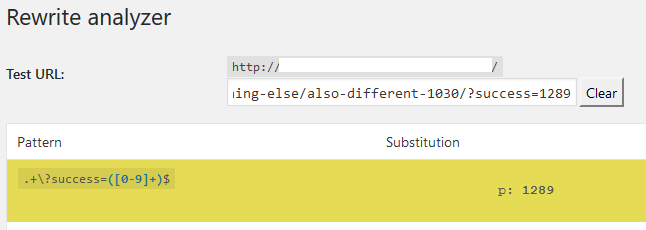The url I am trying to rewrite looks like this.
root_domain/something/something-else/also-different-1030/?success=1289
With this rewrite rule I am trying to catch the url and direct it to the post with ID 1289.
function my_success_rewrite_rule() {
add_rewrite_rule( '.+success=([0-9]+)$', 'index.php?p=$matches[1]', 'top' );
}
add_action( 'init', 'my_success_rewrite_rule' );
Here is the regex I tested for the url.
https://regex101.com/r/nUENTl/1/
In the regex you can see that group 1 catches the post ID or $matches[1]. When I remove the ? from the url it works perfect and redirects any url with success=1289 at the end to the post with ID 1289.
However when I include the ? in the url it does not work, despite taking care of that in the regex by specifying . for any character and + as quanitfier for any number of occurrences and then success at the beginning of the regex before the capture group, the characters inside the ( ) followed by a $ to mark the end of the url string.
What does my rewrite rule need to look like to be able to keep the ? in the url and still rewrite the url to show post 1289 in this case? I am not sure how to escape or take care of the ?. Using .+\?success, so escaping the ? does not work.
I am also using Monkeyman Rewrite Analyzer and it shows me that the rewrite rule is being caught correctly.
I am also using flush_rewrite_rules( true ); in functions.php file to flush the rules each time I save, this to avoid having to manually update the permalinks settings page in the dashboard.
Also I am not adding a rewrite tag since p is a public query var, so no need to add that to WP since I want to get the post by ID, so I need to use p=$matches[1] (I think, pls correct me if this is wrong thinking, thx).
edit
To explain better why I think I need a ? in the url is this. The url is what the user is redirected to upon clicking a verification link. I could of course also omit the ? from the url the user is redirected to but I am not sure if that then is ok or the correct way of doing this.
if ( $verify === $verification ) {
update_post_meta( $form_id, 'verification_id', 'verified', $verify );
wp_safe_redirect( $url . '?success=' . $form_id );
}
So when the verification code is fine I update the post meta, then I take the original url the user was on when doing the verification and add the ?success=$form_id. I thought for WP to handle this fine and for me to also be able to use $_GET['success'] I have to have the ? in the url.
For example later on I am doing this to output information from the post I want.
function catch_success() {
var_export( $_GET );
if ( isset( $_GET['success'] ) ) {
$post_id = $_GET['success'];
$post = get_post( $post_id );
var_export( $post );
$user_reserved_seats = get_post_meta( $post_id, 'user_reserved_seats', true );
var_export( $user_reserved_seats );
}
}
add_action( 'template_redirect', 'catch_success' );
And initially I thought, to be able to use the catch_success function I need to have a ? in the url.
But instead of doing all that I should just omit the ? and redirect to the post I want to right after the verification link checks out?
Because as it stands now I think I have 2 redirects, 1 from the verification link and then from there to the success link and 2 from the success link to the post in question, 1289. I should just redirect to the post in question directly form the verification link, yes? Or I could omit the ? and still have the /success=1289 link redirected with a rewrite rule, to post 1289?
Bit of history, I asked this recently and is has to do with this in the sense that this is a follow up or the next step.


getparameters. Even if you can match it with a regular expression, it won't be a part of the input that gets passed to the rewrite rules. This will never work with the question mark in the rewrite rule ( because that's not how URLs work )?in the url, but if you understand that all I am after is a success page with info about the item that got verified as a form response I might have to just make it simple and direct to the post without redirects. Not sure whether to have a always on static success page where users see their form submit success once and otherwise other info/public info, or if I have a one-time visible per user submit form success page with related user item data and a dynamic url.example.com/?success=1234then be translated toexample.com/?p=1234as there is a?in the url./Im/a/foo/barand turn it into something of the form/index.php?queryvar1=foo&queryvar2=baretc, it's not a search replace. E.g. you can't rewrite on to a different PHP file, and you can't matchGETparameters ( the whole point of permalinks is to hide them in the first place ). There is no hotfix kludge or hack that will make it match the?or anything after it, that's not how URLs work/?p=123? It doesn't, there are no rewrite rules involved inGETparameters, and you can't matchGETparameters